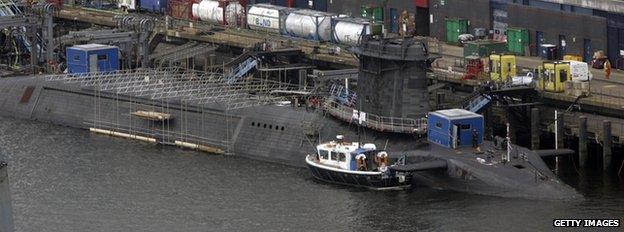Trident politics
- Published

Nuclear and non-nuclear submarines are based at Faslane on the Clyde
Ian Davidson MP seldom skirts round a topic. Indeed, he is characteristically blunt speaking. Depending on circumstances and audience, this can provoke reactions ranging from relief to endorsement to exasperation.
Mr Davidson, who chairs the Commons select committee on Scottish Affairs, adopted his customary mode this morning when interviewed on the wireless, on Good Morning Scotland indeed, anent the future of Trident.
More particularly, the topic was what might happen to Britain's nuclear deterrent in the event of Scottish independence. Or "separation", as Mr Davidson would undoubtedly call it. (See above re range of reactions.)
The Labour MP was quite clear in his mind. The UK government was undoubtedly "making contingency plans". Such, he suggested, was simply "prudent management." Mr Davidson suggested further that UK ministers might usefully own up to this - in order to inform debate.
Ian Davidson: "We want the UK government and the Scottish government both to be open about as much as possible on this."
On the issue of preparation, I think we may say with a fair degree of certainty that Mr Davidson is right, at least in terms of elementary scenario planning by the military minds within the Ministry of Defence.
Remember that the former head of the navy, Lord West, said that - if he were still in post - he would undertake such planning. Indeed, he suggested that he would turn a "Nelsonic blind eye" to any suggestions from political leaders that he should desist.
But why might such orders arise? What prompts Ian Davidson's concern that the topic is being sidelined? The answer, of course, is politics.
It is the UK government's formal, declared position that it will make no contingency plans whatsoever with regard to independence. That applies not just to Trident but to defence more generally, to relations with the European Union, to the currency, to the economy, to…….well, you get the concept.
They take this position, formally, in order to underline their firm forecast that the people of Scotland will reject independence. They are seeking to project a syllogism - and thereby hoping that it will gain currency. It runs like this: Scotland should reject independence ergo Scotland will reject independence ergo planning otherwise is futile. QED.

Ian Davidson is chairman of the Commons select committee on Scottish Affairs
In the meantime, though, while making no formal plans for such an outcome, UK ministers argue that the consequences of independence would be catastrophic for Scotland. This, of course, is designed to reinforce their syllogism. With regard to Trident, they say it would involve the loss of thousands of jobs and would cost billions in enforced redeployment, should the nuclear deterrent have to be moved.
In response, SNP leaders say that Faslane would have a continuing and significant role as the conventional naval base of an independent Scotland.
But Alex Salmond and colleagues also steer clear of precise scenario planning with regard to Faslane and the removal of Trident. They say it will go - but not where or when.
Where, of course, would be a matter for the continuing UK government. If not the south coast of England, then Alex Salmond has suggested, helpfully or otherwise, that the MoD might consider the USA or France as a new home for Trident.
And when? Why will Mr Salmond not spell out a precise timetable? The reason, again, is politics. Mr Salmond envisages privately that he would need bargaining counters in the event of cross-border negotiations in the aftermath of an independence Yes vote. The biggest of these is the nuclear deterrent, currently in Scottish territory.
Put bluntly, an independent Scotland could say - get your tanks off our lawn and your nuclear subs out of our lochs. Or, in negotiation, Nationalists with a mandate could say - let us talk about a timetable for removal and, meanwhile, let us also discuss matters such as the currency and the EU.
Of course, such issues would be much more nuanced, much more subtle - if, indeed, they ever arise. But then the habit of blunt speaking is catching.